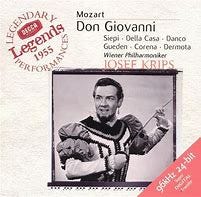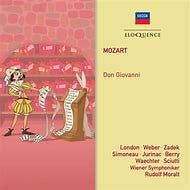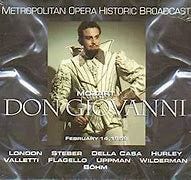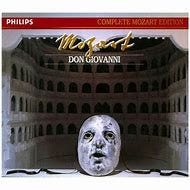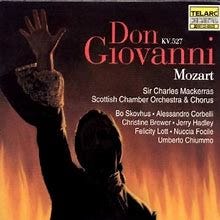Building a Collection #31
Don Giovanni
By Wolfgang Amadeus Mozart
______________________________
Number 31 on the Building a Collection survey is Mozart’s opera Don Giovanni. The full title of the opera is Il dissoluto punito, ossia il Don Giovanni translated as The Rake Punished or Don Giovanni. It is the fourth opera on our list, and the second opera by Mozart (the first being The Magic Flute). Don Giovanni (1788) is in two acts with a libretto by Lorenzo Da Ponte, the same librettist Mozart worked with for The Marriage of Figaro (1786) and Così fan tutte (1790). The opera is considered a “dramma giocoso”, or a comic drama and is based on a Spanish play from 1630 by Tirso de Molina about a libertine (Don Giovanni a.k.a. Don Juan), the name of the original play was El burlador de Sevilla y convidado de piedra, variously translated as The Trickster of Seville and the Stone Guest or The Seducer of Seville and the Stone Guest or The Playboy of Seville and the Stone Guest.
The opera premiered on October 29, 1787, in Prague at the National Theater of Bohemia (now called the Estates Theatre) and is widely regarded as one of the greatest operas of all time.
Wolfgang Amadeus Mozart
The incomparable genius Wolfgang Amadeus Mozart (b. 1756 – d. 1791) was an Austrian composer of opera, symphonic works, concertos, choral and vocal works, keyboard pieces, orchestral works, and chamber music. Despite his short life, Mozart produced more than 800 works, and scholars say he likely composed even more that will never be known or recovered. Mozart was the only son of a proud, infamous, and rather exploitative father by the name of Leopold Mozart. When Leopold realized his son’s prodigious talent on the keyboard, he toured him all around Europe to show him off. It is debated whether these trips contributed to Mozart’s chronic illnesses, as he had bouts of typhus and smallpox during childhood. In any case, it left Mozart with a lot of resentment for his father. Indeed, Mozart would later boycott his own father’s funeral.
Although Mozart was employed off and on by royalty beginning in 1782, he was essentially self-employed. He married Constanze Weber in 1783 without his father’s approval. Astonishingly, by the age of 20 Mozart had written nine operas, five violin concertos, at least 30 symphonies, sets of divertimentos and serenades, many liturgical works, six sonatas, and six concertos for piano. Although Mozart had several teachers, including his father, he was increasingly influenced by Michael Haydn (younger brother of legendary composer Franz Josef Haydn). Between the years 1782 and 1786, Mozart produced a group of piano concertos from no. 12 to no. 25. He would go on to write only two more piano concertos before his death. His final five operas are generally considered his greatest: Le Nozze di Figaro (The Marriage of Figaro), Don Giovanni, Cosi Fan Tutte (All Women Act That Way), Die Zauberflöte (The Magic Flute), and La Clemenza di Tito (The Clemency of Titus). His symphonic production reached its apex with his final four symphonies, nos. 38 – 41.
Mozart’s music remains one of the archetypes of the classical style, and it is known for its intricacy, melodic inventiveness, harmony, and rich textures. Mozart advanced music in ways that were unique and rather bewildering to his contemporaries, and he especially developed the use of counterpoint well beyond where it had been during the late baroque period.
If you would like to read more about Mozart, there are some wonderful biographies including:
Keefe, Simon P (2018). Mozart. Routledge.
Solomon, Maynard (1995). Mozart: A Life. Harper Collins.
Suchet, John (2017). Mozart: The Man Revealed. Pegasus.
Swafford, Jan (2020). Mozart – The Reign of Love. New York: Harper.
Till, Nicholas (1995). Mozart and the Enlightenment: Truth, Virtue and Beauty in Mozart's Operas. New York City: W. W. Norton & Company.
Don Giovanni
After the great success of Mozart’s Le Nozze di Figaro in Prague, the impresario of the National Theater commissioned a new opera from the composer. Mozart wanted to work with librettist da Ponte again for the new opera, but because da Ponte was busy with other projects, the librettist chose to use an existing libretto based on the story of Don Juan. The opera premiere in Prague was another huge success, and Mozart revised a few arias and added an additional scene for the Vienna premiere. Vienna did not receive the opera as enthusiastically, but soon it became standard fare across Europe.
Don Giovanni is set in and around Seville in Spain in the 17th century (although Seville is never mentioned specifically in the opera), and the opera spans a 24-hour time period. The cast and voices for the opera are as follows:
Don Giovanni - nobleman and rake (baritone)
Leporello - Don Giovanni’s servant (bass)
Commendatore - Commandant of Seville and Anna’s father (bass)
Donna Anna - the Commandant’s daughter (soprano)
Donna Elvira - Don Giovanni’s former lover (soprano)
Don Ottavio - Anna’s fiancé (tenor)
Masetto - a peasant (bass)
Zerlina - Masetto’s fiancée (soprano)
Peasants, musicians, dancers, chorus of demons
Similar to his other operas Mozart cleverly underlines the drama with the music. Some prime examples of this include the arias:
Madamina, il catalogo è questo (the so-called “catalog aria”) sung by Leporello, where the music follows the catalog list of Don Giovanni’s conquests in each country.
Là ci darem la mano the familiar seductive duet in Act I with Don Giovanni and Zerlina, where the music is gentle and persuasive.
Or sai chi l’onore by soprano Donna Anna, a promise to seek justice for her slain father. This difficult aria is best sung with a bit of an edge, with emotion, and with confidence.
Dalla sua pace from Act I sung by Don Ottavio, “On her peace my peace depends” has music of the utmost gentleness and beauty reflecting the longed-for peace.
Fin ch’han dal vino (the so-called “champagne aria”) sung by Don Giovanni in Act I, at a rapid clip the Don extols the virtues of drinking, partying, and finding pretty girls.
Deh! Vieni alla finestra in Act II has Don Giovanni pretending to be a servant in order to seduce a maid, inviting her to come to the window. The softly strumming guitar is played to what could be a typical serenade melody.
Il mio tesoro in Act II sung by the tenor role Don Ottavio, an aria that Mozart simplified from the original due to its difficulty. Even though Don Ottavio has a relatively small role in the opera, he is given some of the best music.
Mi tradi quell’alma ingrata by Donna Elvira tells of her love for Don Giovanni despite knowing he is a scoundrel and the wrongs he has committed. It is a song of guilt and shame for feeling the way she does, such is the power of the Don’s seduction on her heart.
Perhaps where you may notice the musical impact on the drama is when the vengeful ghost (presumably the ghost of the Commendatore) comes to life near the end of Act II. He demands repentance and comes to take Don Giovanni to hell. The music that accompanies the ghost is some of the most evocative music ever written by Mozart in terms of foreboding and darkness, and indeed these dark chords have appeared throughout the opera after being referenced in the overture.
For the sake of space, I will not outline the synopsis of the opera but below are links that will give you the full story. Like most any opera, the enjoyment of it is at least somewhat dependent on knowing the characters and how they fit into the story.
https://en.wikipedia.org/wiki/Don_Giovanni
https://www.britannica.com/topic/Don-Giovanni-opera-by-Mozart
https://www.metopera.org/Discover/Synopses/Don-Giovanni/
General consensus is that the opera is about the moral depravity of Don Giovanni and his reckless disregard for women, and furthermore about what happens to the wicked in the end. John Kerns wrote an excellent article for The Atlas Society asking whether Don Giovanni is actually a hero rather than a villain (The Atlas Society promotes the writings of author Ayn Rand, and her particular form of philosophy known as objectivism). Kerns initially makes some good points that when you take religion out of the mix, the Don is not as evil as portrayed and is in many ways morally neutral. However, on the other hand Don Giovanni abuses women, is dishonest about it, has narcissistic tendencies, and is not able to manage his apparent sexual pathology which detracts from intimacy and actual human connection and tends to objectify women in order to meet his own needs. Therefore, while the Don is his own man and steadfastly unapologetic about his deeds and refuses to retreat from his actions, there is a sadness to the story in that he is seemingly incapable of relating to others at a deeper level. So, while Don Giovanni at one level is celebrated for his independence of thought, his grabbing life by the horns attitude, and his representation of liberty, Kerns ultimately concludes he is a morally ambivalent character who engages in irresponsible behavior that injures others. Whether going to hell is the appropriate punishment for what he has done, and his lack of remorse may depend on your own personal beliefs. Certainly, the questions raised by the story are interesting to debate.
The production of Don Giovanni on the opera stage requires a lot of resources, as well as skill with proper casting of voices. Because Mozart calls for four bass/baritone voices, and three soprano voices, it is imperative that the voices can be distinguished from one another, particularly for audio recordings. The role of Don Giovanni himself can be sung by either a bass or a baritone depending on what the director wants to emphasize in the character. A bit higher tone of voice might emphasize the seductiveness and smoothness of personality, while a deeper voice might focus more on the power, control, or darkness of the character. It can be played in different, but equally effective, ways. Leporello, the Don’s assistant, is also a bass voice and is usually sung with a more playful, even comical voice so it is helpful if he and the Don don’t sound the same.
The sopranos should also be distinguishable from each other. The younger Donna Anna generally has a softer, more vulnerable vocal quality, while Donna Elvira usually has more of an edge in her voice and is more demonstrative (and is sometimes sung by a mezzo-soprano). Masetto’s fiancée Zerlina is more innocent sounding with an appealing quality but can still be sung by a more experienced voice.
A “Mozart tenor” with a lighter and more fluid voice is often cast as Don Ottavio, Anna’s fiancé. He is sometimes portrayed as rather weak and whiny, but his arias are among the best in the opera.
Essential Recordings
Before beginning to write about Don Giovanni, I had to admit that of the three Mozart/da Ponte operas, Don Giovanni was the one I knew the least. That has changed, and not only have I become very familiar with many recordings, but I have also learned a huge amount about the opera itself and I have a new appreciation for what Mozart achieved in this opera.
As we have seen with many other works we have covered on our list, there are many fine recordings to choose from, and the goal is to sift through the pile and to separate the great from the merely good or average. Below you will see I have identified two recordings of Don Giovanni which rise above the others and which I believe are essential. Both of them happen to be older recordings. Here I have to also admit a bias on my part specific to Don Giovanni, and that is the older recordings on the whole are better than more recent ones. The quality of Mozart singing and conducting in the 1950s and 1960s was simply at a higher level than in recent decades, and I find that I prefer opera in the grand style more prevalent in those years with larger forces, modern instruments, and big voices. Leaner forces, smaller voices, and thinner orchestral sound don’t satisfy me as much, but this is a personal preference. You will see this bias reflected in my choices below. Having said that, there are a small handful of more recent recordings which are also recommended.
The first essential recording of Don Giovanni is from Austrian conductor Josef Krips and the Vienna Philharmonic and the Vienna State Opera Chorus featuring soloists Cesare Siepi, Anton Dermota, Fernando Corena, Walter Berry, Suzanne Danco, Lisa Della Casa and Hilde Gueden, recorded by Decca in 1955. This account is a classic, and the sound is better than average for its vintage. Cesare Siepi is one of the all-time greats in the role of Don Giovanni and recorded the role many times. His full, warm voice partnered with a dark and rather moody undertone feels ideal for the role, projecting a personality both alluring and menacing. The Don Ottavio of Anton Dermota displays excellent breath control and an appealing tone in his arias. Sopranos Suzanne Danco and Lisa Della Casa are among the finest on record, both of them with thrilling upper registers and both agile enough to navigate Mozart’s more difficult passages. I was not as familiar with soprano Hilde Güden, but her Zerlina is completely convincing and strong. Corena sung the role of Leporello many times, and he brings a lively and almost comical sense to the role, and his enunciation is very good. Krips’ conducting is excellent with few eccentricities, and he elicits a lyrical and burnished sound from the VPO. This is a true classic that lives up to the hype.
The other essential recording of Don Giovanni is from Italian conductor Carlo Maria Giulini and the Philharmonia Orchestra and Chorus along with soloists Eberhard Waechter, Joan Sutherland, Luigi Alva, Elisabeth Schwarzkopf, Giuseppe Taddei, Gottlob Frick, Piero Cappuccilli, and Graziella Sciutti, recorded in 1959 for EMI (now Warner). Another classic account, this recording has been a favorite of collectors for many years. While there may never be a “perfect” recording of this opera, this one is darn close. Giulini’s direction is alert, subtle, and flowing, thankfully avoiding the slower excesses he would develop later. The Philharmonia play as though they were the best orchestra in the world at the time, and they certainly were one of the best. Waechter is more of a baritone, so he delivers a suave and smooth Don consistently well sung with the ability to add a menace to his voice where needed. I find his voice almost too similar to Taddei’s Leporello, but nevertheless they are both very good. Not having heard this recording for a while, I was reminded how fabulous both Sutherland and Schwarzkopf are in this recording. Sutherland is amazing in “Or sai chi l’onore”, simply the best I’ve heard. Schwarzkopf brings a keen edge and real bite to the role of Donna Elvira, a role she recorded many times. She has the full measure of the role, bringing emotion to the surface wonderfully. Luigi Alva’s delightful tenor voice is ideal for Don Ottavio, while Gottlob Frick is memorable as the Commendatore. This is a truly great recording that should be in every Mozart lover’s collection.
Other Recommended Recordings
The rest of the recommended recordings are listed in chronological order based on recording date.
The German conductor Rudolf Moralt was unknown to me before embarking on this survey. Moralt recorded a mono Don Giovanni in 1955 for Decca with the Vienna Symphony Orchestra and Vienna Chamber Chorus with soloists George London, Hilde Zadek, Leopold Simoneau, Sena Jurinac, Walter Berry, Ludwig Weber, Eberhard Waechter, and Graziella Sciutti. London’s Don Giovanni is unlike any other voice on this list and may not be to everyone’s liking as it is burly, non-seductive, and unlikeable and so this is more of a villainous sort of Don. But I like London as an alternative, and he is capable of some lovely singing such as on “Là ci darem la mano”. Hilde Zadek as Donna Anna is gripping and intense. The Donna Elvira of Sena Jurinac is impressive vocally and dramatically. Leopold Simoneau again shows why he is my favorite Don Ottavio on record, his sweet voice just floats above the orchestra and his legato seems ideal for Mozart. As Leporello the young Walter Berry is comical and well-characterized. Scuitti as Zerlina is better than average for the role. Finally Moralt leads a vibrant VSO reading, with more than enough adrenaline and momentum. The mono sound is relatively good for its time, though it has limitations. In summary, an enjoyable set.
The Greek-American conductor Dmitri Mitropoulos recorded a scintillating performance with the Vienna Philharmonic and Vienna Staatsoper Chorus in a live recording from the 1956 Salzburg Festival on the Sony label. Soloists include Cesare Siepi, Elisabeth Grümmer, Leopold Simoneau, Lisa Della Casa, Fernando Corena, Gottlob Frick, Walter Berry, and Rita Streich. Even though in mono sound, this recording is quite clear. Yes, it is from a live performance and so you will notice the voices separate and move around, and at times go in and out of focus. But the live drama and electricity make up for any shortcomings in sound. Siepi was a Don Giovanni for the ages, and he is once again very characterful here. The closing scene is one of the best on record, with the tension rising to a fever pitch. Mitropoulos, in my view one of the most underrated conductors of the twentieth century, never lets the intensity sag and continues to push the drama forward in a wonderful manner. Grümmer as Donna Anna is light but also firm and steely in tone. Della Casa has always impressed me, and she does here as well with her urgent tone and soaring higher register. She infuses each phrase with meaning. Simoneau’s Don Ottavio is my personal favorite in the role, his sweet tenor floats the most sublime high notes and I just enjoy the quality of his voice. Corena is an experienced and effective Leporello, with plenty of weight and comic expressiveness. A young Walter Berry is splendid as Masetto, and Gottlob Frick is again majestic and haunting as the Commendatore. Finally, Rita Streich’s Zerlina is charming with a pretty voice which is perfect for the role. A really great recording.
Austrian conductor Karl Böhm was one of the great Mozart conductors of the century, and his 1957 live mono recording of Don Giovanni with the Metropolitan Opera & Chorus, New York is available on the Andromeda and Music & Arts labels. Soloists are Cesare Siepi, Eleanor Steber, Jan Peerce, Lisa Della Casa, Fernando Corena, Giorgio Tozzi, Theodor Uppman, and Roberta Peters. The first thing is the sound has limitations with some distortion noticeable and as with other live opera recordings the dynamic range is compromised and voices can come in and out of focus. But I urge you to try to get past that and listen to the actual performance. My ideas of Böhm as a boring and unimaginative conductor are blown out of the water here. He leads a performance which is brisk, detailed, vibrant, and dramatic. There is an immediacy to Böhm’s approach which can be heard beginning in the bracing account of the overture. Siepi appears again as the Don, and his very fine performances are remarkably consistent over the years and across different recordings. Eleanor Steber is one of the main highlights of this set, her Donna Anna is gloriously manic with a full, rich tone. Della Casa possessed one of my favorite voices in all of opera, and she is beautiful here (though she cannot match Schwarzkopf for drama). Roberta Peters’ Zerlina is wholly satisfying. Jan Peerce is an interesting choice for Don Ottavio, as the quality of his tenor voice is different from most in that it is a rather large voice for Mozart, but he delivers a splendid performance in his role. Corena as Leporello is superb as usual. If you are tolerant of the sound, this yields many rewards.
Legendary conductor Herbert von Karajan recorded Don Giovanni several times, but the finest performance is from the 1970 Salzburg Festival recorded live in stereo with the Vienna Philharmonic and Vienna Staatsoper, now available on the Orfeo label. The starry cast includes Nicolai Ghiaurov, Gundula Janowitz, Stuart Burrows, Teresa Zylis-Gara, Geraint Evans, Victor von Halem, Rolando Panerai, and Olivera Miljakovic. The sound is good for a live performance, if a bit distant at times. Ghiaurov as Don Giovanni works well, his large bass is resonant, seductive and smooth if a bit unvaried in tone. Geraint Evans’ Leporello is a delight, completely in character and full of personality. The Don Ottavio of Stuart Burrows is one of the best on record, more powerful and confident than we usually hear in the role. Zylis-Gara has a pure tone and creates the needed dynamic impact with Donna Elvira. The Karajan favorite Gundula Janowitz doesn’t disappoint, she is nothing short of stunning as Donna Anna, the steeliness in her voice contributing to her effectiveness. Karajan is more vital and electric here than in his 1985 studio account, but his earlier 1960 live account also with the Viennese is also excellent even if the sound is not quite as good as this one.
Sir Colin Davis led an excellent recording of Don Giovanni with the Covent Garden Orchestra and Chorus, London on the Philips label, recorded in 1972. Soloists are Ingvar Wixell, Martina Arroyo, Stuart Burrows, Kiri Te Kanawa, Wladimiro Ganzarolli, Richard Van Allan, and Mirella Freni. Davis’ leads an energetic account with very good singing, and there is a distinct feeling for the dramatic. I quite like Wixell’s baritone sound, and his multi-dimensional ability to vary his tone depending on the scene is impressive, and his Italian is terrific. Other highlights include the Donna Anna of Martina Arroyo, she is thrilling and full-voiced in her arias. Te Kanawa is not as richly characterized as Schwarzkopf above, but her distinctive and creamy tone is a wonder to behold. Mirella Freni as Zerlina is a much fuller voice than usually heard in the role, and she projects more charm and personality than any Zerlina on record. Welsh tenor Stuart Burrows brings a strong tenor voice to Don Ottavio, again one of the best on record. The sound is bright and clear, with good perspective and depth.
The late Sir Charles Mackerras was one of the world’s greatest Mozart conductors, and he left many wonderful recordings. His 1995 recording of Don Giovanni on the Telarc label features the Scottish Chamber Orchestra and Chorus along with soloists Bo Skovhus, Alessandro Corbelli, Christine Brewer, Jerry Hadley, Felicity Lott, Nuccia Focile and Umberto Chiummo. Modern instruments are used, and although the smaller orchestra produces leaner textures, Mackerras directs them to place powerful accents in certain places to enhance the phrasing and drama. Mackerras liked to employ historically informed practices, but this is a hybrid approach since modern instruments are used and he encourages some rubato. Mackerras’ recording is one of the few I really enjoy from more modern recordings, especially from those that employ historically informed practices. At least there is still enough weight both instrumentally and vocally to carry the drama, where these qualities are sorely lacking in other more recent recordings. Bo Skovhus has a rather sweet, appealing tone as Don Giovanni, but has swagger and confidence too. Christine Brewer is stupendous as Donna Anna, with a big voice and a warm tone, and she certainly has all the top notes. Felicity Lott is no match for Schwarzkopf, and is somewhat faceless in her characterization, but she certainly doesn’t detract from the performance. Jerry Hadley sings well, and even though not as mellifluous as Simoneau, Dermota, or Valletti, he does have more heft in his voice. Nuccia Focile in the role of Zerlina is beautiful if a bit nondescript. In summary not nearly a first choice, but certainly recommended.
If you wish to explore Don Giovanni on DVD, there are a few very good options below which include two acclaimed Don Giovanni singers from recent years, Bryn Terfel and Simon Keenlyside.
Metropolitan Opera & Chorus / James Levine / (2005, DG) / Soloists Bryn Terfel, Renée Fleming, et. al.
Royal Opera House Orchestra & Chorus / Sir Charles Mackerras / (2008, Opus Arte) / Soloists Simon Keenlyside, Joyce DiDonato, Ramón Vargas, et. al.
Other notable recordings
The recordings below all have good qualities but for reasons relating to sound quality or performance didn’t quite make the recommended list. Still, if you love this opera they may be worth exploring.
Glyndebourne Festival Orchestra & Chorus / Fritz Busch (1937, Warner)
Metropolitan Opera Orchestra & Chorus / Bruno Walter (1942, Naxos)
Vienna Philharmonic & Staatsoper / Wilhelm Furtwängler (1950, EMI)
Vienna Philharmonic & Staatsoper / Wilhelm Furtwängler (1953, Orfeo)
RIAS - Berlin and RIAS Chamber Chorus / Ferenc Fricsay (1956, DG)
Vienna Philharmonic & Staatsoper / Herbert von Karajan (1960, Various labels)
Vienna Philharmonic & Staatsoper / Erich Leinsdorf (1960, Decca)
New Philharmonia Orchestra & Chorus / Otto Klemperer (1966, EMI/Warner)
English Baroque Soloists / Monteverdi Choir / Sir John Eliot Gardiner (1995, Archiv)
Mahler Chamber Orchestra / Vocalensemble Rastatt / Yannick Nézet-Séguin (2011, DG)
___________________
Notes:
Brockett, Oscar G. and Franklin J. Hildy. 2003. History of the Theatre. Ninth edition, International edition. Boston: Allyn and Bacon. ISBN 0-205-41050-2.
Eisen, Cliff; Sadie, Stanley (2001). "Mozart, Wolfgang Amadeus". Grove Music Online. Oxford: Oxford University Press. doi:10.1093/gmo/9781561592630.article.6002278233.
Kerns, John. Mozart's Don Giovanni: An Enlightenment Hero? August 13, 2010. The Atlas Society online at https://www.atlassociety.org/post/mozarts-don-giovanni-an-enlightenment-hero
Moore, Ralph. A survey of some major recordings of Mozart’s Don Giovanni. Online at MusicWeb-International https://www.musicweb-international.com/classrev/2021/Jun/Mozart-Giovanni-survey.htm.
Tommasini, Anthony (2004). The New York Times Essential Library: Opera: A Critic's Guide to the 100 Most Important Works and the Best Recordings. New York: Henry Holt and Company. p. 128. ISBN 9780805074598. Retrieved 22 August 2017.
"The 20 Greatest Operas of All Time". Classical Music.
https://www.britannica.com/topic/Don-Giovanni-opera-by-Mozart

